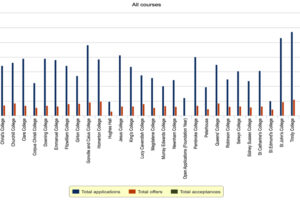
A Guide for Lower Grade Students/Parents of Oxford and Cambridge G5 Programs
UK undergraduate application logic
Strong emphasis on academic focus!
Affected by factors such as US visa policies, more and more students and parents are choosing the UK as their study destination.
But be aware that this differs from the US application logic, which emphasizes diversity, well-rounded development, and internship experience!
UK undergraduate applications emphasize academic focus:
Students only submit one personal statement (PS) to UCAS (the Joint Universities and Colleges Admissions System).
This means they need to apply to five schools/programs with one essay. Therefore, they can essentially only apply to one academic discipline (or several similar programs).
So: Without a strong academic focus, there’s no starting point for the application.
Without academic focus, there’s no depth in the PS. At the same time, UK undergraduate applications emphasize the logic of matching A-Level course selections to specific subjects.
While course selection doesn’t necessarily have to be strictly related to your major, choosing the wrong course can limit your application. 🚫
Decide on your major as early as possible!!!Otherwise, it’s easy to stray further and further, putting you at a disadvantage in today’s fiercely competitive environment.
For students aiming for Oxford and Cambridge’s G5, the depth of your subject matter is even higher!
Most programs at Oxford and Cambridge require written exams and interviews!
Admissions officers will directly test students’ passion for the subject and their academic ability.
Academic ability and depth of knowledge are not something you can achieve overnight!
Competitions/Background Enhancement
- Why do you want to study this course or subject?
- How have your academic experiences prepared you for this course or subject?
- What other preparations have you made beyond academics? Why were these experiences useful?
How should you answer these questions?
The above three questions are the result of the UCAS Personal Statement (PS) reforms to a “sectioned answer” format for the 2025 application season.
Starting this year, the personal statement will be restructured from a single, full essay of no more than 4,000 characters to answer three questions, each of no less than 350 characters.
While the essence remains the same:
Students must demonstrate their interest and ability to study the subject.
From a practical perspective,Competitions and background enhancement can generally focus on these three questions. Use materials to refine your answers.
UK universities emphasize academic motivation and potential.Competition experience often provides dual evidence of motivation and potential, and can be used as a source of improvement for both your abilities and passion.
However, it’s important to emphasize that:
Not having a competition doesn’t mean you can’t apply, andhaving a competition doesn’t necessarily mean you have academic depth.
The key is your true understanding and passion for the subject.
If you want to explore your interests on your own,it’s recommended to start by reviewing the recommended reading lists of major universities and understanding the specific course content.
Understand what you’ll actually learn in this major.
Many university courses differ significantly from A-level content.
The content of background development also depends on the specific major.
For example, applied engineering subjects require practical opportunities for further development.
However, subjects like mathematics require a greater focus on theoretical research.



